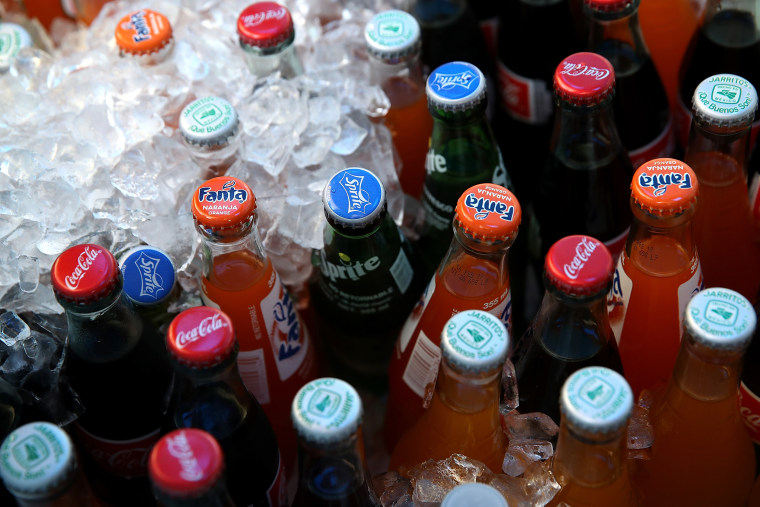More evidence links highly processed food to cancer and death
Evidence linking processed food to serious health issues like cancer and even death continues to mount.
A pair of studies published Wednesday highlights the risk of frequently eating items such as hot dogs, cheese puffs, soda and french fries.
The first study, which looked at more than 24,000 adults in Italy, found that those who consumed ultra-processed foods in large quantities had a higher risk of death overall, and mortality from heart disease in particular, relative to people who ate less food in this category.
The second study followed more than 200,000 U.S. health care workers over a span of 24 to 28 years, and found that men who consumed lots of ultra-processed food — more than nine servings per day, on average — had a 29% higher risk of colorectal cancer than men who ate around three daily servings.
Fang Fang Zhang, the second study’s senior author and an associate professor at Tufts University, said the group with the highest consumption of ultra-processed foods probably got around 80% of their daily calories from those items. The U.S. average is around 57%.
The study did not find an association between the consumption of ultra-processed food and colorectal cancer in women, though scientists aren’t sure why. One theory is that higher levels of estrogen could have a protective benefit, Zhang said. But the result could also be an anomaly, since most risk factors for colorectal cancer are similar for both sexes.
Prior research has linked ultra-processed foods to an increased risk of high cholesterol, diabetes, obesity, cognitive decline, breast cancer and cancer in general.
Foods considered “ultra-processed” contain more artificial ingredients than those that are simply processed by adding salt, sugar or oil. Ultra-processed foods usually have very few whole ingredients and contain flavorings, colorings or other additives. Condiments, microwaveable dinners, packaged doughnuts and ice cream, for example, all fall under this label.
“It’s sort of an attempt to get a definition of junk food, which I think we all sort of know when we see it,” said Walter Willett, a professor of epidemiology and nutrition at the Harvard T.H. Chan School of Public Health who was not involved in either study.
Because the colon and rectum are “on the frontlines of our diet” as part of our digestive system, Willett said, “colorectal cancer seems to be more directly related to diet than most other cancers.”

Colorectal cancer rates have increased among young adults in recent decades. A study from the American Cancer Society found that rates of colon cancer have risen annually among people ages 20 to 39 since the mid-1980s, and the share of rectal cancer in adults under 55 doubled from 1989–1990 to 2012–2013.
“Diet is probably playing a role in the increase in obesity that we continue to see, and we know that obesity is associated with colorectal cancer and other cancers as well,” Caroline Um, a principal scientist at the American Cancer Society, said. “We’re seeing more young adults being obese [and] having things related to obesity, such as diabetes and metabolic syndrome.”
However, the new study of health care workers found that ultra-processed foods were associated with colorectal cancer in men independently of their body mass index.
The researchers therefore suggested that chemical additives in food or synthetic chemicals in packaging could be partially responsible for the trend. Many processed meats contain nitrates and nitrites, preservatives that might raise cancer risk.
“Red and processed meat has been shown to pretty much consistently increase the risk of colorectal cancer,” Zhang said.
Her study found that processed meat products like hot dogs, salami and sausages, as well as sugar-sweetened beverages, were particularly correlated with a risk of colorectal cancer in men.
The Italian study similarly found that poor nutritional quality — defined as an unhealthy balance of sugar, fiber and fat — alone did not explain the association of ultra-processed foods with higher mortality. So Marialaura Bonaccio, the study’s author, said chemical additives likely contribute to the negative health outcomes observed.
“Diet Coke can be rated as nutritionally good — for example, sugar-free Diet Coke because it has no sugar — but that Coke is not even a food,” she said. “It’s a combination of chemicals.”
Bonaccio’s study proposes labeling foods according to their degree of processing, in addition to their nutritional quality, to help people make healthier choices. But other experts think that change might not impact the people most at risk.
“A labeling policy sometimes works for people who have a high level education or income because they pay attention to labels or know how to read the labels,” Zhang said. But labels might be less effective for underserved groups, she…
Read More: More evidence links highly processed food to cancer and death

